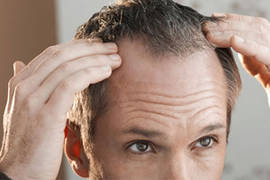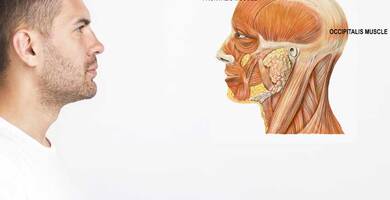Hair loss due to diseases
By Prof. Dr. Soner Tatlidede 2019-09-25

Hair loss because of diseases is not something uncommon. Many people suffer from diseases that lead to a hair fall out, and ultimately need to get a hair transplant with FUE in Turkey. There are not only hair diseases that cause hair loss, but also other illnesses of the body that at the end cause hair falling.
Unfortunately, you can often find hair loss due to various diseases. Early detection of existing diseases in the body, both in terms of health and aesthetics, is very important because early it allows you to limit its adverse effects over the development and the health of your hair.
In fact, both our body and our hair are intimately connected; dry hair, hair loss, dull, gray skin or broken nails are a hint for us that something disturbing is happening in our body. Besides, hormonal balance, diet and the immune system have a great influence on our hair development. Therefore, to prevent hair falling out, it is very important to care of our body.
Diseases that cause hair loss
Contrary to appearances, the percentage of people with hair loss problems due to diseases is quite large. What´s more, hair loss due to grave diseases is a very big problem that should not be underestimated. But if you always take care to solve health problems at the very beginning, you will reduce the risk of hair problems and baldness.
A diet for a healthy hair is very important, too. Hair needs good quality nutrients for a healthy growth: mainly protein, vitamins and minerals. During illness, the cause of hair fall is a lack of sufficient nutrients due to a lack of adequate blood supply with oxygen and nutrients to the hair follicles. An additional thing is the weakening of the immune system during the disease, which leads to inflammation and possible hair loss.
Hair falling due to gender
Hair, depending on gender, falls out for various reasons. It should also be remembered that the hair falls out every day and this is completely normal. However, the main causes of increased hair loss are genetic considerations, seasonal hair loss and just-occurring diseases.
The occurrence of the disease can lead to the weakening of the hair or even its complete destruction. It can make hair thin, and even there can be empty places, especially on top of the head. You should carefully look at your body and do not underestimate such important alarm signs.
Causes of hair loss in men:
- Genetic predispositions
- Stress
- Medicines
- Age
- Diseases
- Environmental factors
Causes of hair loss in women:
- Hormonal disorders
- Pregnancy
- Stress
- Lifestyle
- Emotional shock
- Breast-feeding
- Medicines
- Diseases
- Genetics
- Environmental factors
Skin diseases that cause hair loss
Hair is made of a very durable protein, called keratin. The dermis is located under the epidermis, the outer layer of the skin, and this is where hair bulbs are located; these are the only living parts of the hair that have the ability to divide themselves. It is thanks to the hair bulbs that the hair grows: that is why their condition is so important.
The hair bulb is located in the hair follicle, which is connected to the blood vessels through the capillaries in the hair papilla. These connections provide for hair the necessary nutrients for a proper cell division, growth and development. It is in the hair follicle that the most important hair stem cells are found. For their proper cell division, i.e. hair growth, it is necessary to provide good quality nutrients on a daily basis.
Hair and nails reflects the general condition of the body. Our body works in such a way that at first it provides nutrients to key organs of the body, and then after their nutrition, the rest of the ingredients are transported to the skin, hair and nails. Therefore, it can be easily determined whether there are any disproportions in the body.
In summary, don´t forget that the condition of the skin is very important for the health of the hair itself. Skin problems caused by autoimmune disorders, like alopecia areata, can lead to the loss of your hair not only on the head scalp, but in the entire body.
Hair loss due to thyroid disorders
The thyroid gland is located in the lower part of the neck. It produces triiodothyronine T3 and thyroxin T4; these hormones affect many processes in the human body. In addition, the work of the thyroid gland is coupled with the work of the pituitary gland: the pituitary gland secretes the TSH hormone, which stimulates the thyroid gland to secrete T3 and T4. When these are secreted, a negative feedback begins suppressing excessive hormone secretion.
Increased concentration of the TSH hormone in the blood indicates hypothyroidism, while decreased means hyperthyroidism. In addition, if you have hypothyroidism, there is a shortage of sebum, which makes the hair dull, dry and easily breakable. On the other hand, in hyperthyroidism the amount of sebum secreted is excessive, adversely affecting the hair: thus it becomes greasy, having a bad influence on its condition.
Both hyperthyroidism and hypothyroidism cause hormonal imbalance. For this reason, grave thyroid problems are the most common cause behind hair loss. The hormonal imbalance associated with this causes a diffuse hair loss, and if left untreated, it can also lead to full hair loss. However, when thyroid problems are discovered quite early, hair loss can be avoided.
In mild hypothyroidism or hyperthyroidism, and in minor or temporary problems in the functioning of the thyroid gland, hair losing should not occur. Lastly, hair loss due to thyroid disease occurs several months after the onset of symptoms, unfortunately, because of this many people may think that thyroid medicines causes hair loss and stop using them. This, unfortunately, leads to even more intense hair falling.
Losing hair due to scalp fungus
Dermatophytosis or ringworm is a disease caused by fungi that have permanent contact with the surface of the human skin. Infection usually occurs through contact with a sick person or their personal belongings. However, the body has its own defence mechanisms, so you should not be afraid of little contact with the person affected by this disease. In addition to hair fall, the symptoms of this disease include red skin, itching and pain.
There are several types of ringworm; it causes both diffuse and circular hair loss. During the occurrence of ringworm of the scalp, the hair root is damaged, leading to hair falling out. It is very important to react quickly to changes. as soon as any skin changes of the head appear, you should immediately consult a dermatologist.
Early-discovered fungal disease leads to a faster response and less risk of hair falling. Waiting a longer time to visit a doctor causes a complete damage to the hair follicles, which leads to hair loss and problems with its regrowth.
Autoimmune diseases and hair loss
Diseases can lead to hair loss and ultimately alopecia. One of the most common causes of alopecia in autoimmune diseases is alopecia areata. But, how to stop hair loss from an autoimmune disease?
In autoimmune diseases the body treats its own cells as foreign ones. To protect himself from the danger of "foreign" cells, it attacks them and tries to destroy them. To detect the occurrence of such a disease, medical diagnosis is necessary. In the case of alopecia areata, it usually appears before the age of thirty; unfortunately, the earlier it appears, the harder it is to cure it.
At the beginning there is only one small place affected by the disease; over time, the number of bald places increases. This is quite a difficult situation, because most of the hair is lost in a short time, and within a few weeks, you may be completely bald. Alopecia areata has many varieties; hair loss can cover the entire head area or one part of the body. Treatment varies depending on the extent, but may include minoxidil, topic products, or even laser therapy.
In cases when alopecia areata appears due to coeliac disease, a gluten-free diet normally leads to a full recovery of the body hair. So, the answer to the common question "Does coeliac disease cause hair loss?" is that yes, because coeliac disease and hair loss are connected, but the correct treatment eliminating the gluten from the patient´s diet lead to the regrowth of the hair.
Hair loss due to food or digestive system
There are diseases that cause hair loss and weight loss, like the aforementioned coeliac disease; but in any case, digestive system health plays a key role in maintaining hair health. Besides, some organs malfunction may lead to hair falling; for example, many people wonder "Does liver disease cause hair loss?": the answer is yes, hair loss is one of its symptoms, indeed.
One of the most important parts of the digestive system is the colon. In fact, our well-being and many important body functions are associated with colon health. Unfortunately, hair loss caused by intestinal disorders is a fairly common problem.
Especially the risk of hair falling can be seen with Crohn's disease - inflammatory bowel disease. In addition, hair loss can also be caused by intestinal parasites, irritable bowel syndrome and other chronic bowel diseases.
The intestine is the place where nutrients are absorbed into the blood. Therefore, intestinal problems lead to problems with insufficient hair building components. Because of this, the hair gets weaker and consequently hair falls out.
Hair loss due to diabetes
Diabetes is a metabolic disease. Unfortunately, due to its impact on the insufficient amount of nutrients, it leads to hair loss. This is because diabetes affects the hormonal balance of the body; and imbalance leads to disorders in hair growth and regeneration.
In diabetes, one of the problems that prevents proper hair growth is blood viscosity disorder, caused due to an increase in blood density because of a high amount of glucose in the blood. In this situation, it´s more difficult for small capillaries to provide to the hair follicles the necessary ingredients.
An additional consequence of diabetes is also a damage to the blood vessels of the hair, which leads to a slowdown in their growth and also hair loss. An increased amount of sugar in the blood leads to a weakening of the body's immune system, too, which results in the appearance of infections that further weaken the hair. As in previous diseases, time crucial: the sooner diabetes is detected, the greater the chance that there will be no need for hair loss treatment.
What should I do if my hair starts falling?
It should be remembered that one of the most important things when treating hair loss is to ensure its regeneration. Aesthetic effects are a very important aspect; however, hair health is the most important.
Since the hair reflects the general condition of the body, as soon as you notice any alarming sign, it is worth going to the doctor. This is especially recommended when you feel tired or weak, and your hair additionally falls out.
Clinicana is located at the best hair transplant hospital in Turkey, and our medical team has the required experience and skills to provide you with a solution to any hair health problem that may arise. If you want to know if your hair loss is caused by diseases, simply contact us using our online consultation service. Is totally free!








